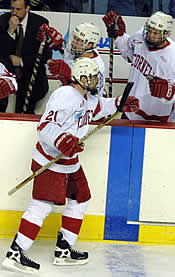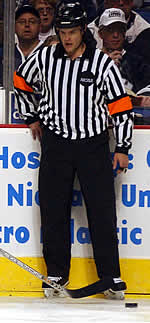HSBC Arena is no stranger to a goal-or-no-goal controversy. On June 19, 1999, Brett Hull’s tally in triple overtime of Game 6 gave the Dallas Stars a 2-1 victory over the Buffalo Sabres and the Stanley Cup.
Buffalo fans have long held that Hull’s skate was in the crease, and that the goal should have been disallowed.

In Friday’s first NCAA semifinal at HSBC, the “home” team again was on the short end of a close goal call. Shane Palahicky’s deflection at 12:06 of the first period, initially ruled a goal for Cornell, was disallowed for a high stick after video review. It would have staked the Big Red to a 1-0 lead. Instead, New Hampshire got the game’s first official goal about four minutes later and held on for a 3-2 win.
Not only did the disallowed score cost Cornell a goal in a one-goal loss, it swung momentum the other way for the remainder of the first period. Before Palahicky’s deflection off a shot from the point by Jeremy Downs found the back of the net, Cornell had dominated play, outshooting the Wildcats 7-1.
After the goal was disallowed, UNH outshot the Big Red 10-0 for the remainder of the period. One of those shots beat Cornell netminder David LeNeveu, giving the Wildcats a lead they never relinquished.
“I thought after the no-call on the goal, we played much better,” said UNH coach Dick Umile.
Goaltender Mike Ayers agreed. “Once that goal got disallowed, I thought the guys really stepped up and played hard,” he said.
Greg Shepherd, the video replay official, ruled Palahicky’s stick was illegally high. Rule 6-20-c of the NCAA Rule Book states, “Batting the puck above the height of four feet with the stick is prohibited.”

Palahicky had his stick just above waist level, but raised the blade to reach the puck as it came to him. The deflection skipped under the glove of Ayers and into the net. The play was called a goal by referee Don Adam and was put on the scoreboard.
After a lengthy video review, the word came down: no goal.
Cornell downplayed the call, and disagreed with the UNH assessment that it caused a big momentum swing.
“Obviously it was a little bit of a letdown,” Big Red co-captain Stephen Baby said. “We thought it might have been have been a goal, but it went up [to the video replay judge] and they ruled against us.
“There’s really nothing you can do. We tried to continue with the momentum from there. I don’t think there was a sense of deflation. After that, they started putting more shots on net and we took a penalty, but I thought we were able to regroup.”
Cornell coach Mike Schafer said he thought the momentum swing was due more to undisciplined play in the second half of the first period than the disallowed goal.
“I thought our guys had been playing very well and then we had to kill off a power play,” he said. “Any time you’re playing well five-on-five and you take a penalty, it can shift the momentum.”
While a holding penalty to Travis Bell contributed to UNH keeping the momentum on its side in the latter stages of the first period, the key moment did seem to be the no-goal ruling. Cornell fans might disagree with the call, but the guy who had one of the best views of the play had no doubt.
“I had a good feeling about it,” said Ayers. “I went to the ref and said my piece and he said, ‘Don’t worry, we’re going upstairs with it.’
“I’m just glad they made the right call.”


